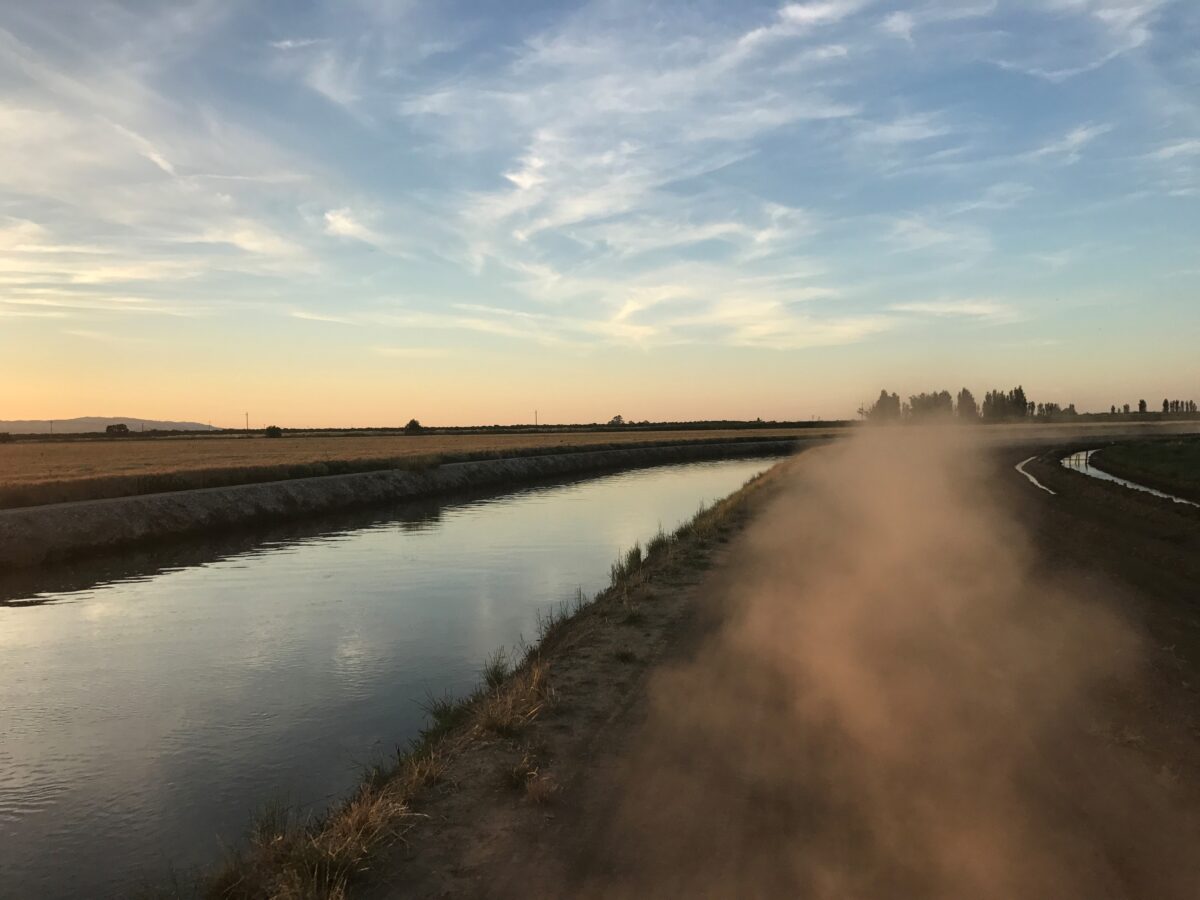For the first time in several decades, policy makers in Sacramento seem poised to actually do something about California’s dysfunctional water rights systems. There are three promising policies winding their way through the Legislature this session. All three bills just made it out of the committee review process, and are slated to be voted on by June 2. These incremental changes are a long-overdue start toward addressing California’s outdated and unjust water rights system.
The package of water rights bills before the Legislature offers critical updates to the State Water Resources Control Board’s (“Water Board”) ability to make informed and timely water management decisions and build climate resilience for the future for everyone in the state.
“Water is protected for the use and benefit of all Californians. California’s waters cannot be owned by individuals, groups, businesses, or governmental agencies.”
State of California Water Board
As I recently explained, the origin of California’s water rights systems is steeped in the bigotry of the 19th century. The system privileges a class of senior water rights holders to the detriment of others. A lot must be done to change the water rights system in California, yet, even communities that have been “systematically marginalized” by the system share an interest in improving its enforcement, including stopping water theft, as outlined in the 2022 California Curtailment Cases Amicus Brief.
These bills are simple reforms that do not represent a paradigm shift, but rather provide the state with common sense tools and oversight authority to ensure the current water rights system works. If passed, they will reduce uncertainty and facilitate more adaptive water management.
The three water rights modernizations under deliberation are
- Assembly Bill 460 (Bauer-Kahan): Water Board can immediately stop illegal diversions with “interim relief” powers and higher penalties for water theft.
- Assembly Bill 1337 (Wicks): Water Board can curtail diversions regardless of basis of right (includes pre-1914 rights).
- Senate Bill 389 (Allen): Water Board can investigate and verify pre-1914 water rights.
Should we expect a political showdown and stormy fight on the floor? Or will California’s Assembly and Senate be willing to pass common sense modernizations to right-size the water rights system to the challenges posed by the 21st century?
Let’s dig into each bill and explore why California needs them to become law and how the bills could improve the water rights system.
Assembly Bill 460 clarifies the Board’s emergency powers to hold illegal water users accountable
AB 460 (Bauer-Kahn) protects farmers, ranchers, tribes, disadvantaged communities, wildlife, and other users from the bad actors who try to take advantage of the lax water rights enforcement process at the Water Board.
This legislation is needed to provide the Water Board with the ability to administratively provide “interim relief.” In other words, they need authority to issue temporary restraining orders to immediately stop water theft and prevent irreversible harm to other water users and/or the environment. This bill would only affect those who violate existing law and does not introduce new restrictions on legal water rights holders. It also increases financial penalties to better discourage water theft.
One of the motivations for AB 460 is to prevent another “Shasta River Rebellion” or “Standoff” which made the headlines in August 2022. The Shasta River Water Association (SRWA) deliberately and illegally diverted flows of up to 30 cubic feet per second from the Shasta River east of Yreka for 8 days in direct violation of the Water Board’s emergency drought curtailment orders. During this period, the river’s flow dropped a third of the required minimum summer flow (18 of 50 cubic feet per second). That flow is necessary to protect habitat for species like juvenile salmon. SWRA was fined only $4,000 for their water theft.
The SWRA delivers water to a group of around 110 farmers and ranchers and one lumber mill located between the towns of Grenada and Montague near the Oregon-California border. That fine amounted to $40-50 each. The SWRA is a senior water rights holder with a single 1912 appropriative water right for irrigating 3854.77 acres, decreed by a 1932 Court decision:

The SWRA actions last August caused irreparable harm to salmon and tribes in the watershed. The Shasta River is one of the last salmon producers for the Klamath River.
During the Assembly’s February informational water rights hearing, Karuk Tribal Council Member Arron “Troy” Hockaday (Karuk) spoke. Council Member Hockaday’s contribution to the hearing starts around 2:11 through 2:26, and it is worth listening for yourself.
Driven by drought and water quality conditions in the Klamath River, since 2017 the Karuk committed to only harvesting 200 salmon for their ceremonies. As he explained, the tribe continues the practice to today, in an effort to protect their own future needs they limit their current use and remind us that fish are the most senior water rights holders. Hockaday described how just two weeks before the SRWA’s illegal diversion from the Shasta River, a thunderstorm went over the McKinney Fire sending ash and debris into the river leading to the creation of a 50-mile stretch of the Klamath River with zero oxygen, that killed tens of tens of thousands of fish:
Then two weeks later the farmers tell us they’re gonna take water from the Shasta River. And they took it. I cried that day, I’m still emotional right now. Living here and seeing what they did is devastating. It’s our future. It’s our future for our children, our culture, our way of life. And to have us get kicked when we’re already down is a very sad day.
Council Member Arron “Troy” Hockaday (Karuk)
Perhaps this is an extreme and flagrant example. But with climate change, more droughts, and periods of scarcity before us, might this standoff set an ugly precedent for other senior rights holders? AB 460 seeks to prevent just that.
Due to restrictions in the current law, it can take weeks, or longer, for the Board to stop unauthorized water use. Illegal diverters, like the SWRA, can drain rivers in the meantime, like they did last August, while the Board goes through a complicated process to stop water theft.
In addition to giving the Water Board the authority to immediately stop water theft, AB 460 increases the enforcement penalties for those in violation of current law while also allowing the Water Board to immediately halt water theft like those from August 2022. If AB460 is enacted as proposed, violators could be subject to fines of up to $10,000 per day and $2500 per acre-foot of water diverted.
Assembly Bill 1337 levels the playing field for all rights holders
The second bill before the Legislature, AB 1337 (Wicks), gives the Water Board the authority to be able to curtail all water rights when there is a shortage. During California’s frequent droughts, the Water Board needs to be able to balance residential, cultural, agricultural, industrial, and environmental water demands. Some senior water rights holders have sued the Water Board over their orders to stop (curtail) water uses during drought emergencies.
The 2022 California Curtailment Cases’ court of appeal ruling suggested that a legislative fix, which AB 1337 provides, is necessary to give the Water Board broader authority to enforce the current water rights system, including senior water rights holders. Recently, reporter Dan Walters summarized the legal history motivating this bill. As he explains it, AB 1337 would finally give the Water Board “the legal authority to curtail diversions from rivers—even by those who now hold the most senior water rights, those gained prior to the state asserting authority over water in 1914.”
I previously explained how unjust the current system is, in part because of how pre-1914 water rights were generally unavailable to minorities. Allowing the Water Board jurisdiction over this group of senior water right holders ensures everyone is fairly participating in the state’s water system.

Senate Bill 389 gives the Board authority to verify senior water rights holders’ claims
Shockingly, major classes of water rights still do not require any kind of permit or license from the Water Board. As the Water Board explained in February, these represent roughly 45% of all water rights in the state and account for 30-35% of all surface water diversions by volume. The bill gives the Board ability to gather information to investigate these water rights claims and determine if they are accurate, or as is sometimes the case, inflated. Verifying senior water rights could make more water available for other rights holders during droughts.
SB 389 (Allen) would give the Water Board the ability to investigate and verify pre-1914 rights by determining whether a diversion is based on its type—riparian right, appropriation, or some other basis. A unified permitting system, as proposed by this bill, would “reduce uncertainty for all right-holders and enable more efficient and transparent real-time management of water,” according to a 2015 PPIC report.
How can you help?
For the first time in decades, our state legislators are taking on some of the most broken pieces of the current water rights system. Yet, there is fierce opposition from the water industry to stop them and preserve the status quo. UCS and our coalition partners are asking for public support to improve the outdated water rights system.
Together, if passed, these bills could give the Water Board the ability to regulate all water rights holders in the state equally; to immediately stop water theft that could cause irreparable harm to others; and to actually identify and verify the most senior water rights claims in the state.
These modest changes are a first step in retrofitting the water rights system for the 21st century challenges ahead.
Do you live in California? Click here to take action!

